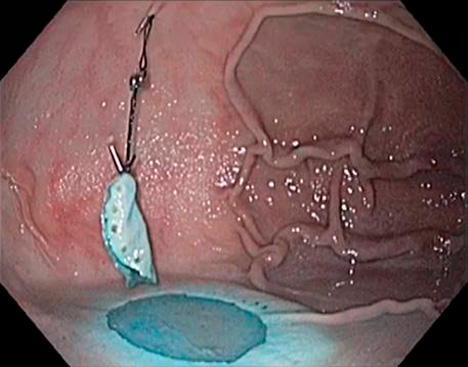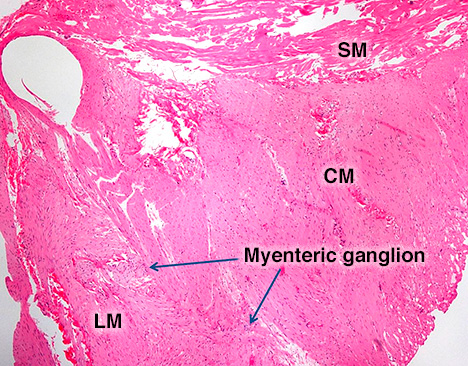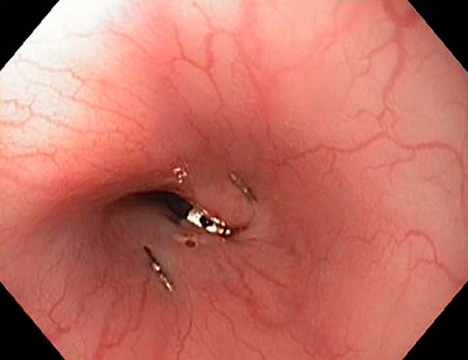Research Projects
Research in Dr. Rajan's Developmental Endoscopy Laboratory is focused on creating innovative devices and techniques to diagnose and treat gastrointestinal diseases.
Our lab has several ongoing research initiatives, including these projects:
Endoscopic resection of early cancers or large polyps in the colon, rectum and stomach
Magnet traction
Magnet traction

Magnet traction
This image shows a large tissue resection in the stomach using a magnet traction device.
Our goal in this project is to develop techniques that allow for resection of large polyps and select early cancers through the endoscope that were previously not amenable to conventional endoscopic techniques. We're developing a new magnet traction device for use in a resection technique that is safe, efficient and easy to use.
References
- Dobashi A, Storm AC, Wong Kee Song LM, Gostout CJ, Deters JL, Miller CA, Knipschield MA, Rajan E. Efficacy and safety of an internal magnet traction device for endoscopic submucosal dissection: Ex vivo study in a porcine model (with video). Surgical Endoscopy. 2019; doi:10.1007/s00464-018-6486-4.
- Dobashi A, Storm AC, Wong Kee Song LM, Deters JL, Miller CA, Tholen CJ, Gostout CJ, Rajan E. An internal magnet traction device reduces procedure time for endoscopic submucosal dissection by expert and non-expert endoscopists: Ex vivo study in a porcine colorectal model (with video). Surgical Endoscopy. 2019; doi:10.1007/s00464-019-06817-8.
Endoscopic muscle biopsy to identify all cell types, including myenteric neurons and interstitial cells of Cajal (ICCs)
Resected tissue
Resected tissue

Resected tissue
This image of a resected tissue sample (H&E stain) from a gastric muscle biopsy shows muscularis propria and myenteric ganglia.
In collaboration with Mayo Clinic gastroenterologists Gianrico Farrugia, M.D., and Madhusudan (Madhu) Grover, M.B.B.S., our lab has worked extensively to identify a readily available effective and safe endoscopic technique to biopsy the deep muscle layer of the gut wall for evaluation of the enteric nervous system, immune cells and ICCs. Current routine biopsies are superficial and don't contain muscle tissue for analysis.
We developed an innovative technique to obtain deep muscle biopsies from the stomach in order to provide insights into the pathogenesis of gastroparesis. Our ongoing efforts are focused on further refining the endoscopic approach to obtain deep muscle biopsies from the gastrointestinal tract. Our goal is to advance knowledge of the pathophysiology of gastrointestinal motility disorders, leading to potential targeted and curative therapies.
References
- Rajan E, Gostout CJ, Wong Kee Song LM, Szarka LA, Kashyap PC, Smyrk TC, Bingener J, Deters JL, Knipschield MA, Bernard CE, Farrugia G. Innovative gastric endoscopic muscle biopsy to identify all cell types, including myenteric neurons and interstitial cells of Cajal in patients with idiopathic gastroparesis: A feasibility study (with video). Gastrointestinal Endoscopy. 2016;doi:10.1016/j.gie.2016.04.029.
- Rajan E, Al-Bawardy B, Gostout CJ, Wong Kee Song LM, Deters JL, Knipschield MA, Bernard CE, Farrugia G. Endoscopic muscle biopsy sampling of the duodenum and rectum: A pilot survival study in a porcine model to detect myenteric neurons. Gastrointestinal Endoscopy. 2018; doi:10.1016/j.gie.2017.07.023.
- Rajan E, Gostout CJ, Aimore Bonin E, Moran EA, Locke RG, Szarka LA, Talley NJ, Deters JL, Miller CA, Knipschield MA, Lurken MS, Stoltz GJ, Bernard CE, Grover M, Farrugia G. Endoscopic full-thickness biopsy of the gastric wall with defect closure by using an endoscopic suturing device: Survival porcine study. Gastrointestinal Endoscopy. 2012; doi:10.1016/j.gie.2012.07.010.
- Rajan E, Gostout CJ, Lurken MS, Talley NJ, Locke GR, Szarka LA, Sumiyama K, Bakken TA, Stoltz GJ, Knipschield MA, Farrugia G. Endoscopic "no hole" full-thickness biopsy of the stomach to detect myenteric ganglia. Gastrointestinal Endoscopy. 2008; doi:10.1016/j.gie.2007.10.017.
- Rajan E, Gostout CJ, Lurken MS, Talley NJ, Locke GR, Szarka LA, Levy MJ, Sumiyama K, de la Mora-Levy JG, Bakken TA, Stoltz GJ, Knipschield MA, Farrugia G. Evaluation of endoscopic approaches for deep gastric-muscle-wall biopsies: What works? Gastrointestinal Endoscopy. 2008; doi:10.1016/j.gie.2007.06.024.
Endoscopic anti-reflux procedure
Magnet closure device
Magnet closure device

Magnet closure device
This image shows an endoscopic view of the augmented lower esophageal sphincter using a magnet closure device.
Gastroesophageal reflux disease (GERD) is a common disorder characterized by abnormal reflux of gastric contents into the esophagus, causing troublesome symptoms and mucosal damage. Our lab is developing a new anti-reflux endoscopic technique to augment the lower esophageal sphincter in a minimally invasive approach that has the unique, appealing feature of reversibility.
References
Other research projects
In addition to these projects, our lab has several other ongoing projects in partnership with medical device companies, including the study of innovative approaches for noninvasive detection of colorectal polyps and cancer, weight loss devices, and endoscopic closure devices for management of defects or perforation of the gut wall.